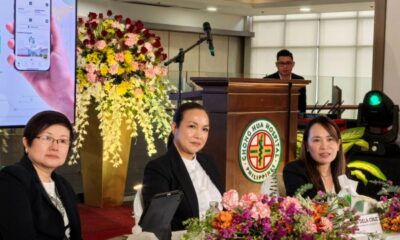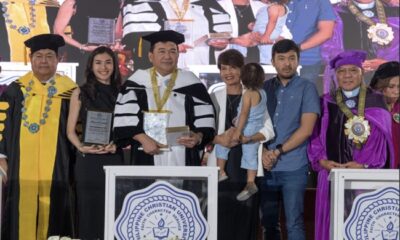News
PRRD’s Federalism Push in Full-Swing in 2018
As the first Philippines’ President from Mindanao, Rodrigo R. Duterte has made federalism one of his major campaign promises during the 2016 elections. However, it was only in 2018 where efforts to push for this new system of government went in full-swing.
On Jan. 23 this year, Duterte signed the appointment of members of the Consultative Committee (ConCom) to review the 1987 Constitution with former Chief Justice Reynato Puno as chairman. Aside from Puno, Justices, ex-legislators, lawyers, academics, among other experts comprise Duterte’s ConCom.
This came after Duterte, on Dec. 7, 2016, signed Executive Order No. 10 creating the ConCom, which was tasked to study, conduct consultations, and review provisions of the 1987 Constitution and draft a proposed federal Constitution which is expected to distribute powers and resources among the regions.
Duterte’s ConCom held its first session on Feb. 19 this year at the Philippine International Convention Center (PICC) where Puno urged its members to ensure that the federal government will be “possessed with the power to hold together the union in perpetuity and with the energy and the endurance to convert to robust reality the dreams of our people, however long it takes.”
Four months after it convened, the 22-member ConCom approved unanimously, in an en banc session on July 3 this year, the proposed federal charter which has 22 articles compared to the 1987 Constitution’s 18 articles.
Among the ConCom’s federal charter’s provisions include a ban on political dynasties and political turncoatism; a ban on monopolies and oligopolies that lessen competition; additional powers for the Ombudsman and Commission on Audit among others; the inclusion of socio-economic rights in the Bill of Rights; and the establishment of a permanent and indissoluble nation.
Also, under the draft federal Constitution, there are 18 federated regions composed of 16 symmetrical regions– existing regions plus Negrosanon Federated Region and two asymmetrical regions — Bangsamoro and Cordillera. Bangasamoro and Cordillera have different designs from other regions because of their “identity-based demands.”
Puno said although there was no timeline for a plebiscite on the draft federal Constitution since it was for Congress to decide, the best time to hold it would be in May 2019, noting that this would give more people time to understand the proposed new Constitution.
Bayanihan Federalism
On July 9 this year, the ConCom turned over its draft “Bayanihan” (working together) federal Constitution to the President in a ceremony held in Malacañang Palace. It also released the official copy to the media and the public to allow them to freely “debate and deliberate” on every Article, every Section, every sentence, and every word in the draft Constitution.
Hours after receiving the proposal, Duterte approved “in toto” (as a whole) the ConCom’s draft federal Constitution and said he will endorse it to the Congress, except for the transitory provisions which he wanted amended.
Earlier, Duterte said he was willing to lead the transition to federalism as long as it was within the end of his term in 2022. However, he changed his mind and said he would rather “cut” his term as early as 2019 to be coterminous with the start of the transition period to erase suspicions about his desire to stay in power beyond the end of his term in 2022. Duterte also said he wanted to “enable a younger leader to take over.”
The ConCom initially wanted Duterte to lead the 10-member Transition Commission on Federalism which will “formulate and adopt a transition plan for the orderly shift to the new system of government, as provided for in the new Constitution.”
But the ConCom reviewed and revised the Transitory Provisions in accordance with the President’s instructions. Eventually, ConCom’s proposed federal charter barred Duterte from running for President in the 2022 elections under the proposed federal Constitution.
After the ratification of the proposed federal Constitution, there must also be an election of a transition President and Vice President in tandem as provided for in the same charter.
The ConCom presented its proposed federal charter to the House of Representatives and Senate on July 11 and 17, respectively.
Also on July 17, the ConCom released its final and official draft of the proposed federal charter which bars Duterte from running in the 2022 elections.
In his 3rd State of the Nation Address (SONA), Duterte thanked the ConCom for drafting a federal constitution and submitting it to him last July 9, describing it as “a distinct honor and privilege.”
Duterte also reiterated that has no intention to stay beyond the end of his term in 2022 regardless of what Constitution is in place.
Information drive and task force
On July 26, Malacañang said the government has around PHP90 million for its public information drive to explain the benefits the country will get under the proposed federal system of government.
Of the amount, PHP50 million will come from the ConCom’s savings and additional PHP30 million will also be set aside for the expert panel.
Meanwhile, PHP10 million will go to the Presidential Communications Operations Office (PCOO), which will be tasked to produce information drive materials.
Prompted by his economic managers’ apprehensions on the proposed federal charter’s economic aspects, Duterte also decided to allow the draft to be open for public feedback to help improve the proposal.
Amid congressional deliberations on the country’s proposed PHP3.8 billion budget the federalism information drive took what Communications Secretary Martin Andanar described as a “power nap.” The Senate, in particular, insisted that it will not prioritize talks on Charter Change or federalism.
A Pulse Asia Survey conducted from Sept. 1 to 7, showed that only 3 percent of Filipinos wanted the government to focus on federalism while more than half or 63 percent of Filipinos believed the administration must first address inflation.
However, the federalism drive started to gain momentum after Duterte, under Memo Circular No. 52 signed by Executive Secretary Salvador Medialdea by authority of the President on Oct. 31, created an Inter-Agency Task Force on Federalism (IATF) to raise public awareness on the proposed new system of government, amid survey results showing it is the least of Filipinos’ concerns.
Duterte’s IATF will take charge of “integrating, harmonizing, and coordinating ongoing efforts towards federalism and constitutional reform.”
Among the inter-agency’s tasks are to develop strategies and implement such activities necessary and proper to raise public awareness on federalism and constitutional reform and prepare an information dissemination and public communication plan to ensure an effective, efficient, and uniform undertaking of advocacy activities.
Interior Assistant Secretary Jonathan Malaya expressed confidence that awareness on federalism has increased due to the holding of roadshows nationwide and the creation of the IATF.
He, however, acknowledged that even if more Filipinos became aware of federalism, there is no guarantee that support will follow.
Earlier, Presidential Spokesperson Salvador Panelo said there is still much time left for the Senate to tackle charter change and federalism before the President steps down in 2022.
Panelo said the Palace is still confident that the Senate will support federalism after the proposed 2019 national budget is passed. (PNA)
































